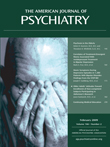A Meta-Analysis of Head-to-Head Comparisons of Second-Generation Antipsychotics in the Treatment of Schizophrenia
Abstract
Objective: Whether there are differences in efficacy among second-generation antipsychotics in the treatment of schizophrenia is a matter of heated debate. The authors conducted a systematic review and meta-analysis of blinded studies comparing second-generation antipsychotics head-to-head. Method: Searches of the Cochrane Schizophrenia Group’s register (May 2007) and MEDLINE (September 2007) were conducted for randomized, blinded studies comparing two or more of nine second-generation antipsychotics in the treatment of schizophrenia. All data were extracted by at least three reviewers independently. The primary outcome measure was change in total score on the Positive and Negative Syndrome Scale; secondary outcome measures were positive and negative symptom subscores and rate of dropout due to inefficacy. The results were combined in a meta-analysis. Various sensitivity analyses and metaregressions were used to examine bias. Results: The analysis included 78 studies with 167 relevant arms and 13,558 participants. Olanzapine proved superior to aripiprazole, quetiapine, risperidone, and ziprasidone. Risperidone was more efficacious than quetiapine and ziprasidone. Clozapine proved superior to zotepine and, in doses >400 mg/day, to risperidone. These differences were due to improvement in positive symptoms rather than negative symptoms. The results were rather robust with regard to the effects of industry sponsorship, study quality, dosages, and trial duration. Conclusions: The findings suggest that some second-generation antipsychotics may be somewhat more efficacious than others, but the limitations of meta-analysis must be considered. In tailoring drug treatment to the individual patient, small efficacy superiorities must be weighed against large differences in side effects and cost.



